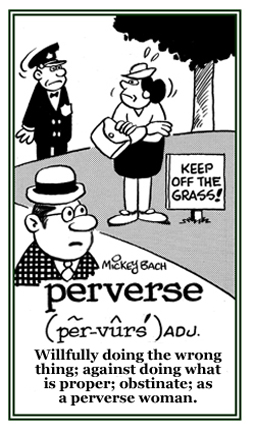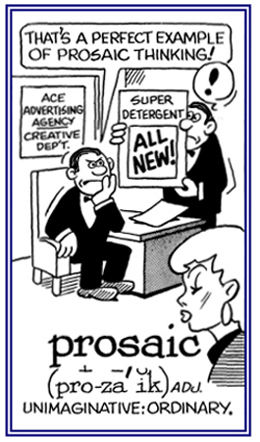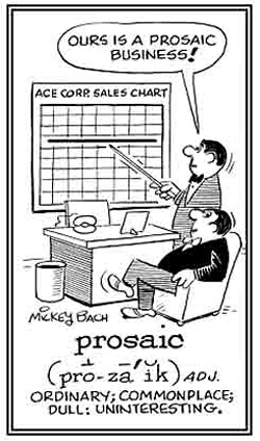vers-, vert-, -verse, -version, -version, -versation, -versal, -versary, -vert, vort-, vors-
(Latin: bend, turn)

Go to this Word A Day Revisited Index
so you can see more of Mickey Bach's cartoons.
Currently "thumbs down" is believed to be the signal by which Roman spectators condemned a vanquished gladiator to death.
The Roman custom of spectators' voting on the fate of wounded gladiators with their "thumbs up" did not mean that the downed gladiator was to be spared. In fact, it meant that the gladiator was to be killed.
Thumbs down signified "swords down" and meant that the loser was worth more to them alive than dead, and he was spared to make up for his disgrace in the next contest.
Whenever a combatant was seriously wounded, the presiding judge, or "referee", was called upon to determine whether the man should live or die, depending on how well he fought.
The judge usually went along with the mood or desire of the spectators. If they cheered, applauded, and gave the "thumbs-down" and indicated that they liked the man, he was carted off to fight another time.
If they gave him the silent "thumbs-up" treatment, his opponent was given the signal to finish him off. The corpse was then dragged off with a hook.
The misconception of "thumbs up" and "thumbs down" is probably the result of a painting.
Our misinterpretation of the thumbs-up and thumbs-down apparently came about because a French artist Léon Gérôme understood the Latin verso (turned) to mean "turned down" and so in his painting Pollice Verso (1873), he showed the death sentence with the "thumbs-down" gesture.
Apparently the painting was so popular that Gérôme's mistake became the universally accepted interpretation as we know it today.
2. Lacking in imagination and spirit; dull; ordinary: The guests exchanged prosaic remarks and kept looking at their watches because of the humdrum conversation that was going on.
3. Etymology: from Middle Latin prosaicus; from Latin prosa, "straight speech"; past participle of provertere, "to turn forward" from pro-, "before, forward" + vertere, "to turn".


Go to this Word A Day Revisited Index
so you can see more of Mickey Bach's illustrations.
2. A commonplace expression or quality.
3. Etymology: from Old French prose, from Latin prosa oratio, "direct speech"; from prosa, prosus, "direct, straightforward"; from Old Latin provorsus, "moving straight ahead"; from pro-, "forward" + vorsus, "turned", from vertere, "to turn".


